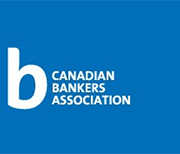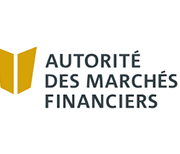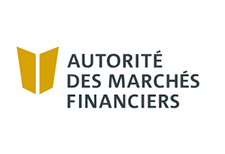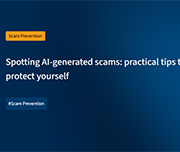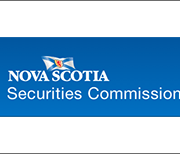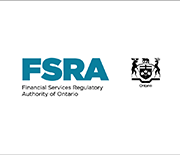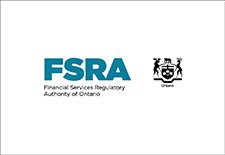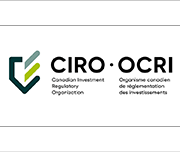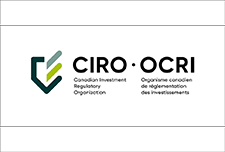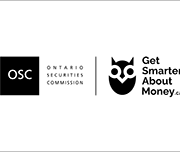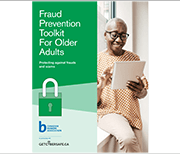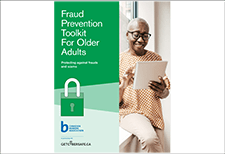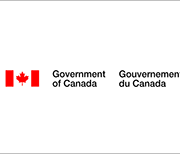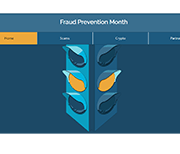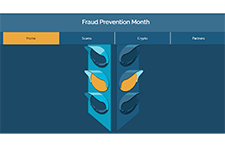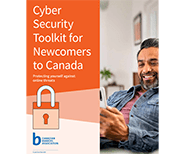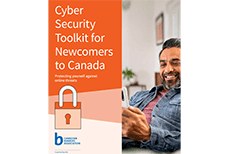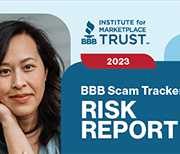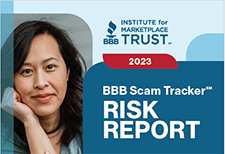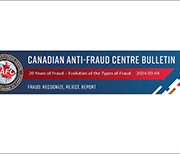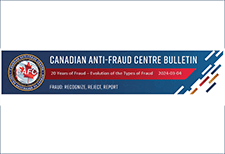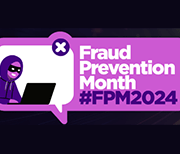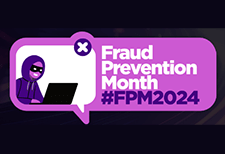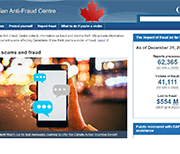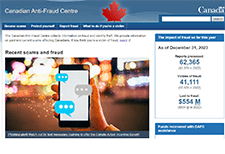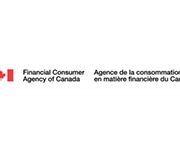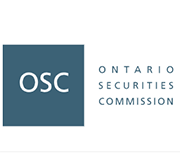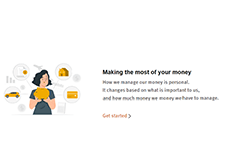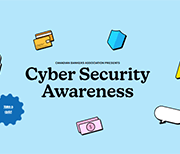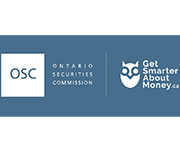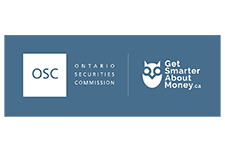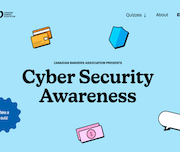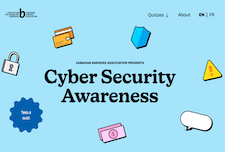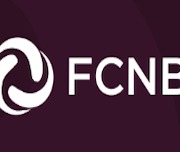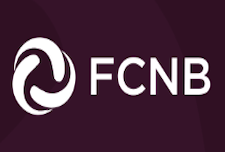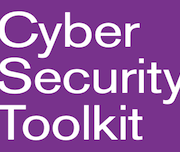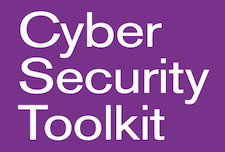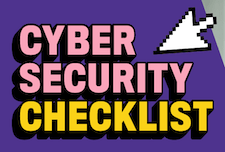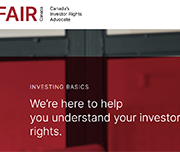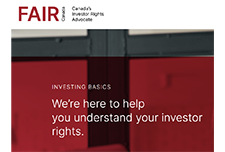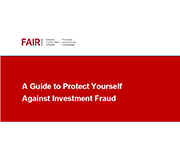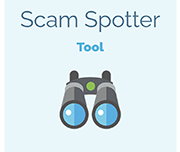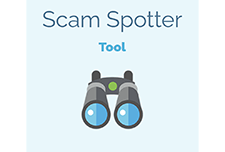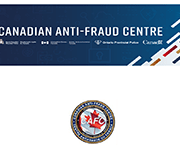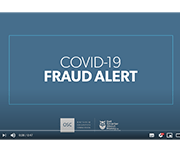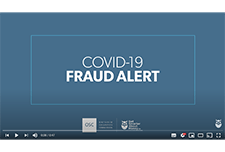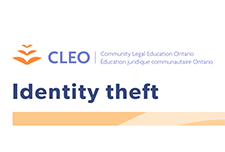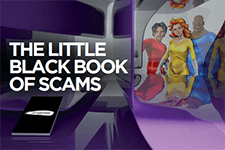Making the most of your money
Managing money is challenging. In the current economic environment, it has become even more difficult. For people living on a low-income, managing the day-to-day expenses, let alone life changes or emergencies, can be overwhelming. Prosper Canada has created an online course that you can share or use with your clients to help them access tools and resources to support their daily money management. Making the most of your money is an easy-to-use, accessible, online course to help people living on a low income organize their finances and explore ways to increase the amount of money coming in and reduce what is going out. This interactive course has activities, videos, handouts and resources that are also downloadable.
Threats and intimidation to pay your tax bill? How to spot tax season scams
During the income tax filing season, scammers pose as representatives of the Canada Revenue Agency (CRA) in an attempt to trick you into sending payment for fictitious "debts" or into providing sensitive personal information that they can use to commit fraud. Learn more on how to spot tax season scams and what to do if you are the victim of fraud.
Cyber security awareness quizzes
Discover a new quiz site to help Canadians and Canadian small businesses protect against phishing scams. The Canadian Bankers Association has created four quizzes for Canadians to learn more about cyber fraud and how to prevent becoming a victim. Quiz #2: Social engineering: a peek behind the curtain Quiz # 3: Protecting your small business from phishing attacks Quiz #4: How to protect yourself and others
English
Investing with interest: tips and tools for maximizing your savings
IWI – Worksheet #1: What do you want to save for?
IWI – Worksheet #2: Tracking your income and expenses
IWI- Worksheet #3: Are you ready to invest?
IWI- Worksheet #4: What can you invest in?
IWI-Worksheet #5: Where can you get advice?
IWI-Worksheet #6: Watch out for investment frauds and scams
IWI-Worksheet #7: Tips for success
Resources
Crypto Quiz, OSC
Grandparent scams and how to avoid them, OSC
Compound interest calculator, OSC
Emergency fund calculator, OSC
Tips to keep your credit card safe, OSC
Investment products, OSC
Types of fraud, OSC
Multilingual financial resources for Ontarians, OSC
Pay down debt or invest tool, OSC
Reporting fraud, OSC
Introduction to investing, OSC
Scam spotter tool, OSC
Your trusted person and why they matter, OSC
Getting Your Money Back; An Investor’s Guide to Navigating Canada’s Complaint System, FAIR Canada
Study explores Canadian attitudes about Crypto, OSC
How the stock market works, OSC
The basics of personal finance, Credit Canada
What is risk tolerance in investing, OSC
Eight common investment scams and how to spot them, OSC
4 signs of investment fraud, OSC
Evolution of the fraud pitch , Canadian Anti Fraud Centre
Saving or investing for short-term goals, OSC
Investor questionnaire, CIRO
Fees matter, MFDA
Fee calculator, OSC
Annual information about your investment fees, OSC
Investing basics, CIRO
The many faces of elder abuse, OSC
How to Read Your Account Statement and the Things to Focus on, CIRO
Long-haul scammers: Fraudsters who invest time to take your money, OSC
Cybersecurity and Fraud, CIRO
Investor’s guide: cryptocurrencies, CIRO
Artificial intelligence and investor behaviour, OSC
Loan and Trust, FSRA
Fighting Fraud 101: Smart tips for investors, First Nations Development Institute
Financial Planners and Financial Advisors, FSRA
Glossary of common investing terms, CIRO
Invest smart: Taxes and investing, CIRO
Investing charts, OSC
French
L’intérêt d’investir: Conseils et outils pour maximiser votre épargne
Ressources
Questionnaire sur les cryptoactifs, Commission des valeurs mobilières de l’Ontario
Les arnaques des grands-parents et comment les éviter, Commission des valeurs mobilières de l’Ontario
Calculatrice épargne REER, Commission des valeurs mobilières de l’Ontario
Calculatrice intérêts composés, Commission des valeurs mobilières de l’Ontario
Calculatrice fonds d’urgence, Commission des valeurs mobilières de l’Ontario
Astuces pour garder votre carte de crédit en toute sécurité, Commission des valeurs mobilières de l’Ontario
Produits d’investissement, Commission des valeurs mobilières de l’Ontario
Types de fraude, Commission des valeurs mobilières de l’Ontario
Ressources financières multilingues pour les Ontariennes et les Ontariens, Commission des valeurs mobilières de l’Ontario
Calculatrice rembourser des dettes ou investir, Commission des valeurs mobilières de l’Ontario
Signaler une escroquerie, Commission des valeurs mobilières de l’Ontario
Planification de la retraite, Commission des valeurs mobilières de l’Ontario
Questionnaire préparation des investisseurs, Commission des valeurs mobilières de l’Ontario
Introduction au placement, Commission des valeurs mobilières de l’Ontario
Outil détecteur d’escroquerie, Commission des valeurs mobilières de l’Ontario
Votre personne de confiance et les raisons qui expliquent son importance, Commission des valeurs mobilières de l’Ontario
Une étude explore les attitudes des Canadiens à l’égard de la cryptomonnaie, Commission des valeurs mobilières de l’Ontario
Le fonctionnement de la bourse, Commission des valeurs mobilières de l’Ontario
Académie d’investissement, Commission des valeurs mobilières de l’Ontario
Quelle est votre tolérance au risque en matière d’investissement? CVMO
Huit escroqueries courantes en matière d’investissement et comment les repérer, CVMO
Quatre signes de fraude liée aux placements, CVMO
Bulletin : Évolution des types de fraudes, Centre centreantifraude du Canada
Épargner ou investir pour réaliser des objectifs à court terme, CVMO
Questionnaire de l’investisseur, OCRI
Calculateur de frais, CVMO
Information annuelle sur vos frais de placement, CVMO
Principes de base en matière de placement, OCRI
Choisir un conseiller, OCRI
Les nobreuses facettes de l’exploitation financière envers les personnes âgées, CVMO
Comment lire votre relevé de compte et les éléments particuliers qu’il contient, OCRI
La cybersécurité et la fraude, OCRI
Intelligence artificielle et comportement des investisseurs, CVMO
Planificateurs financiers et conseillers financiers, ARSF
Glossaire des placements, OCRI
Investir judicieusement : les impôts et les placements, OCRI
Tips to keep your credit card safe
Your credit card can help you make purchases quickly without needing to have cash on hand. Follow these tips by the Ontario Securities Commission to use your credit card safely.
Fraud alert videos
Learn more about fraud in this latest set of videos by the Ontario Securities Commission.
Cyber security awareness
The Canadian Bankers Association has created a new Cyber Security Awareness Quiz site to test your knowledge and ability to spot a “phishy” email, message or text.
Cyber security & fraud prevention learning guide
Banks take fraud very seriously and have highly sophisticated security systems and teams of experts to protect you from financial fraud. As a banking customer, there are also simple steps you can take to recognize cyber crime and protect your personal information and your money. Educating yourself, your family and your employees about cyber safety can seem overwhelming, but it doesn’t have to be that complicated and the CBA has developed a learning path to help.
Beware: Crypto scams on the rise
Fraudsters often use emotions to lure people in, making a person feel afraid of missing out on an opportunity that others are profiting from. With all the cryptocurrency hype in the media and online, it’s no surprise that scammers are taking note and trying to cash in on investors’ interest in digital currencies. Read this article for more information on the top crypto-related scams you should know.
Beware of One Time Passcode scams with these tips
While cyber criminals are always looking for ways to trick you into revealing information they can use to access your accounts, we have a few simple tips to avoid getting tricked by “one time passcode” scams that you may encounter while attempting to access your accounts securely.
Cyber security toolkit
There are also simple steps you can take to recognize cyber threats and protect yourself. With a cyber hygiene checklist and tips on how to spot common scams, the CBA’s Cyber Security Toolkit can help you protect against online financial fraud.
Cyber security checklist
Getting cyber safe doesn't have to be complicated. With the right resources and tools, you can stay safe and secure online. Here's a handy checklist for protecting your data online.
Reporting fraud
A comprehensive set of articles are available on the Ontario Securities Commission website on how to identify and report fraud as well as what to do if you have been defrauded.
Grandparent scams and how to avoid them
Imagine a loved one is in trouble or hurt. You get a call asking for urgent help. You’d likely want to act right away because you care about them. Exploiting family ties is the driving force behind grandparent scams — or emergency scams. This article from the OSC can help you to protect yourself from becoming a victim of an emergency scam. Watch this new video to learn more about grandparent scams.
Investing basics
Whether you’re a first-time investor, thinking of saving for your education, or planning for your retirement, FAIR Canada's investing basics may help you on your investing journey.
Scam spotter tool
FCAC new consumer information – electronic alerts
Le français suit l’anglais. As of June 30, 2022, banks will be required to send electronic alerts to their customers to help them manage their finances and avoid unnecessary fees. Some banks have already started sending these alerts to their customers. The electronic alerts are part of the new and enhanced protections in Canada’s Financial Consumer Protection Framework (the Framework) that comes into effect on June 30, 2022. To inform Canadians about electronic alerts and their benefits, the Financial Consumer Agency of Canada (FCAC) published new consumer information on electronic alerts, developed an infographic, and prepared social media content that you can use on your own social media channels. Under the Framework, banks will be required to: À compter du 30 juin 2022, les banques seront tenues d’envoyer des alertes électroniques à leurs clients afin de les aider à gérer leurs finances et à éviter de payer inutilement des frais, ce que certaines ont déjà commencé à faire. Ces alertes font partie des mesures de protection nouvelles ou améliorées prévues dans le Cadre de protection des consommateurs de produits et services financiers du Canada (le Cadre) qui entre en vigueur le 30 juin 2022. Pour informer les Canadiens et les Canadiennes à propos des alertes électroniques et de leurs avantages, l’Agence de la consommation en matière financière du Canada (ACFC) a publié de nouveaux renseignements à ce sujet pour les consommateurs. Elle a également créé une infographie et préparé du contenu pour les réseaux sociaux que vous pouvez utiliser dans vos propres comptes de médias sociaux. En vertu des dispositions du Cadre, les banques seront tenues :
Fraud Prevention Toolkits
In 2021, losses reported to the Canadian Anti-Fraud Centre reached an all time high of 379 million with Canadian losses accounting for 275 million of this. Fraud Prevention Month is a campaign held each March to inform and educate the public on protecting yourself from being a victim of fraud. This year's theme is impersonation, and focuses on scams where fraudsters will claim to be government official, critical infrastructure companies, and even law enforcement officials. This collection of fraud prevention toolkits is available in English and French. In English: En Français:
Making more purchases online? Beware of fake websites and phony retailer apps
Many of us have shifted some of our shopping online during the pandemic – it’s easy and very often you can have items delivered right to your door. Criminals are taking advantage of the increased popularity of online shopping by creating fake websites and apps that look authentic but are just a ploy to steal your personal information. The Canadian Banker's Association helps you identify fake websites and apps and shares tips on how to protect yourself while shopping online and what to do if you are a victim of an online shopping scam.
COVID-19 Fraud Alerts
GetSmarterAboutMoney.ca is an Ontario Securities Commission (OSC) website that provides unbiased and independent financial tools to help you make better financial decisions. This series of videos increases awareness of fraudulent activity during COVID-19. Topic include:
Identity theft
Identity thieves try to use your personal information to take money from your bank account, shop with your credit card, or even commit crimes in your name. This publication explains how to spot the warning signs of identity theft, how to protect yourself, and what you can do if it happens to you.
Beware of scams related to the coronavirus
Scammers are taking advantage of the coronavirus (COVID-19) pandemic to con people into giving up their money. Though the reason behind their fraud is new, their tactics are familiar. It can be even harder to prevent scams right now because people 62 and older aren’t interacting with as many friends, neighbors, and senior service providers due to efforts to slow the spread of disease. This blog post presents consumer protection toolkit resources produced by Consumer Financial Protection Bureau in addition to tips for consumers regarding COVID-19 related scams.
New Risks and Emerging Technologies: 2019 BBB Scam Tracker Risk Report
The Better Business Bureau Institute for Marketplace Trust (BBB Institute) is the 501(c)(3) educational foundation of the Better Business Bureau (BBB). BBB Institute works with local BBBs across North America. This report uses data submitted by consumers to BBB Scam Tracker to shed light on how scams are being perpetrated, who is being targeted, which scams have the greatest impact, and much more. The BBB Risk Index helps consumers better understand which scams pose the highest risk by looking at three factors—exposure, susceptibility, and monetary loss. The 2019 BBB Scam Tracker Risk Report is a critical part of BBB’s ongoing work to contribute new, useful data and analysis to further the efforts of all who are engaged in combating marketplace fraud. Update February 24, 2022: BBB Scam Tracker- Risk Report 2020
Seniors: tips to help you this tax season
As a senior, you may be eligible for benefits and credits when you file your taxes. The Canada Revenue Agency has tips to help you get all of them! This page includes tips for seniors at tax time and links to relevant Government of Canada resources.
Video: Debt collection scams
Dealing with debt collection issues can be challenging—especially when you’re not sure if the person you’re being contacted by is a legitimate debt collector or someone trying to scam you. This video from the Consumer Financial Protection Bureau in the United States shares useful tips on spotting debt collection scams and protecting yourself from scammers.
The Little Black Book of Scams (2nd edition)
Scammers are sneaky and sly. They can target anyone, from youngsters to retirees. They can also target businesses. No one is immune to fraud. Read this booklet to find out how you can also become a fraud-fighting superhero. Share this booklet with family and friends and start powering up!
Our group of superheroes has found a way to see through the scams. Their secret is simple: knowledge is power!


